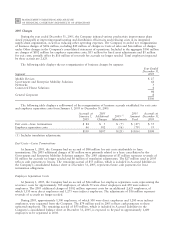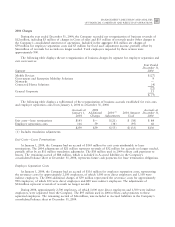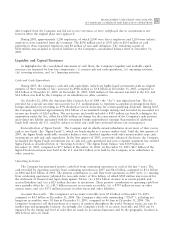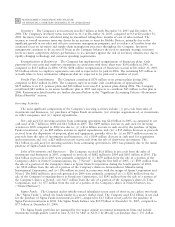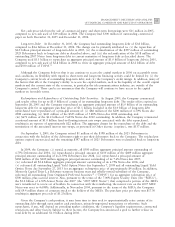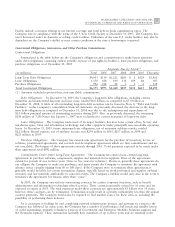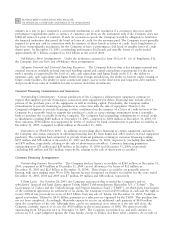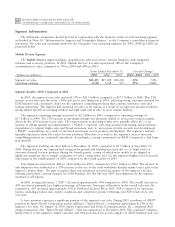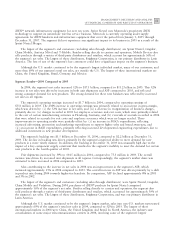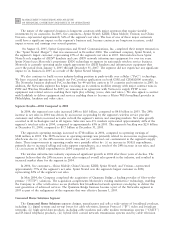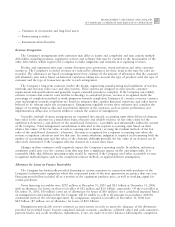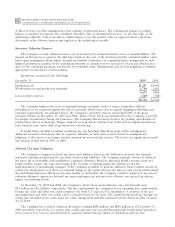Motorola 2005 Annual Report Download - page 65
Download and view the complete annual report
Please find page 65 of the 2005 Motorola annual report below. You can navigate through the pages in the report by either clicking on the pages listed below, or by using the keyword search tool below to find specific information within the annual report.
58 MANAGEMENT'S DISCUSSION AND ANALYSIS
OF FINANCIAL CONDITION AND RESULTS OF OPERATIONS
industry as a way to give customers a convenient mechanism to seek resolution if a contractor does not satisfy
performance requirements under a contract. A customer can draw on the instrument only if the Company does not
fulfill all terms of a project contract. If such an occasion occurred, the Company would be obligated to reimburse
the financial institution that issued the bond or letter of credit for the amounts paid. The Company is not generally
required to post any cash in connection with the issuance of these bonds or letters of credit. In its long history, it
has been extraordinarily uncommon for the Company to have a performance/bid bond or standby letter of credit
drawn upon. At December 31, 2005, outstanding performance/bid bonds and standby letters of credit totaled
approximately $1.1 billion, compared to $1.0 billion at the end of 2004.
Off-Balance Sheet Arrangements: Under the definition contained in Item 303(a)(4) (ii) of Regulation S-K,
the Company does not have any off-balance sheet arrangements.
Adequate Internal and External Funding Resources: The Company believes that it has adequate internal and
external resources available to fund expected working capital and capital expenditure requirements for the next
twelve months as supported by the level of cash, cash equivalents and Sigma Funds in the U.S., the ability to
repatriate cash, cash equivalents and Sigma Funds from foreign jurisdictions, the ability to borrow under existing or
future credit facilities, the ability to issue commercial paper, access to the short-term and long-term debt markets,
and proceeds from sales of available-for-sale securities and other investments.
Customer Financing Commitments and Guarantees
Outstanding Commitments: Certain purchasers of the Company's infrastructure equipment continue to
request that suppliers provide financing in connection with equipment purchases. Financing may include all or a
portion of the purchase price of the equipment as well as working capital. Periodically, the Company makes
commitments to provide financing to purchasers in connection with the sale of equipment. However, the
Company's obligation to provide financing is often conditioned on the issuance of a letter of credit in favor of the
Company by a reputable bank to support the purchaser's credit or a pre-existing commitment from a reputable
bank to purchase the receivable from the Company. The Company had outstanding commitments to extend credit
to third-parties totaling $689 million at December 31, 2005, compared to $294 million at December 31, 2004. Of
these amounts, $594 million was supported by letters of credit or by bank commitments to purchase receivables at
December 31, 2005, compared to $162 million at December 31, 2004.
Guarantees of Third-Party Debt: In addition to providing direct financing to certain equipment customers,
the Company also assists customers in obtaining financing directly from banks and other sources to fund equipment
purchases. The Company had committed to provide financial guarantees relating to customer financing totaling
$115 million and $78 million at December 31, 2005 and December 31, 2004, respectively (including $66 million
and $70 million, respectively, relating to the sale of short-term receivables). Customer financing guarantees
outstanding were $71 million and $29 million at December 31, 2005 and December 31, 2004, respectively
(including $42 million and $25 million, respectively, relating to the sale of short-term receivables).
Customer Financing Arrangements
Outstanding Finance Receivables: The Company had net finance receivables of $260 million at December 31,
2005, compared to $170 million at December 31, 2004 (net of allowances for losses of $12 million at
December 31, 2005 and $2.0 billion at December 31, 2004). These finance receivables are generally interest
bearing, with rates ranging from 3% to 10%. Interest income recognized on finance receivables for the years ended
December 31, 2005, 2004 and 2003 was $7 million, $9 million and $18 million, respectively.
Telsim Loan: On October 28, 2005, the Company announced that it settled the Company's and its
subsidiaries' financial and legal claims against Telsim Mobil Telekomunikasyon Hizmetleri A.S. (""Telsim''). The
Government of Turkey and the Turkish Savings and Deposit Insurance Fund (""TMSF'') are third-party beneficiaries
of the settlement agreement. In settlement of its claims, the Company received $500 million in cash and the right to
receive 20% of any proceeds in excess of $2.5 billion from any sale of Telsim. On December 13, 2005, Vodafone
agreed to purchase Telsim for $4.55 billion, pursuant to a sales process organized by the TMSF. This purchase has
not yet been completed. Accordingly, Motorola expects to receive an additional cash payment of $410 million
upon the completion of the sale. Although there can be no assurances as to when or if the sale will close, the
Company currently expects to receive the $410 million in the second quarter of 2006. The gross receivable
outstanding from Telsim was zero at December 31, 2005. The Company is permitted to, and will continue to,
enforce its U.S. court judgment against the Uzan family, except in Turkey and three other countries. As a result of


